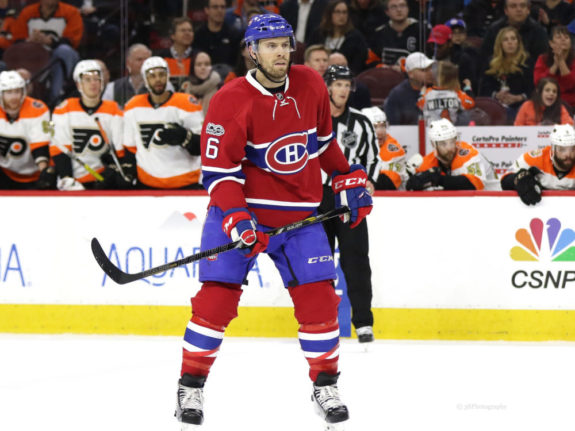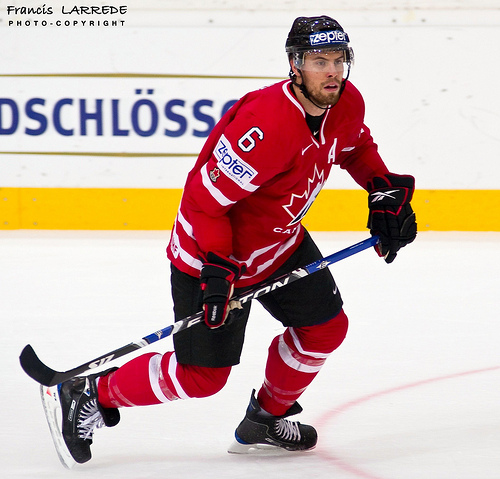It feels like since Shea Weber arrived in Montreal, every possible criticism has been thrown at him. Critics have said he is too slow, can’t move the puck or the game has passed him by. He is indeed the opposite of the fan favourite he was traded for and Weber will never be P.K. Subban on or off the ice. While the Nashville Predators have soared since Subban’s arrival and the Habs have floundered in that same time, Weber is far from the problem in Montreal. He has come as advertised, continuing to be the high-end defenceman he has always been.
Shea Weber vs. the Critics
The notion that Weber is on a rapid decline at age 32 doesn’t hold up. Considering that Ryan Suter and Brent Burns are the same age as Weber, no one is pointing to a decline for them. Weber has never been the quickest skater in the league at any point in his career but it doesn’t hinder him from succeeding. Being a great skater doesn’t automatically make someone a good defenceman. It certainly helps with how fast the players are these days, but if you don’t have the hockey IQ or can’t defend at all, it’s hard to justify it.

Weber doesn’t fit the profile of that modern age, puck moving defenceman in the Erik Karlsson mould, but he has continued to play at a high level since coming over to the Habs. He doesn’t move the puck by skating it into the offensive zone but he does make effective break out passes, a skill that many Habs defencemen struggled with this year. While Weber is known for his incredible shot and physicality, his hockey IQ has always been top notch and a big part of his success. He is rarely caught wildly out of position and doesn’t often make glaring mistakes.
Some of the game’s best defencemen in recent years have aged well. Nicklas Lidstrom played until he was 41 and could have conceivably played another season but he left on a high note. A strict diet and fitness regimen have a 41-year-old Zdeno Chara still playing at a high level for the Boston Bruins. Even Andrei Markov bounced back big time after multiple major knee surgeries and is playing in the KHL at 39. Weber’s contract goes until the 2025-26 season when he will be 41. It’s hard to say now whether he will complete the entirety of that deal but there is no indication that Weber is slowing down. His injury this year was a one off accident, which is far less concerning than a chronic issue involving concussions, knees or the back.
Consistent Performer
The myth that Weber needs a great puck moving defenceman beside him to succeed has persisted in recent years. While in Nashville, he was blessed playing with the likes of Suter and Roman Josi but Weber has not had that luxury in Montreal. His best partner in Montreal to date was a 39 year old Andrei Markov. His other partners? Alexei Emelin, Nathan Beaulieu, Victor Mete, Jordie Benn etc. In fairness, Mete is only 19 and just scratching the surface of what he can be. The others are bottom pairing defencemen at best.

Weber put up 42 points in 78 games last season and 16 points in 26 games this year while playing on a injured foot that eventually required surgery since the first game of the season. Those are pretty good numbers on a team that struggles to score. The left side on defence is a weakness for Montreal and they don’t have a complete top defence pairing. Giving Weber a better partner helps his game, but they need more balance on that first pairing. For example, if the pairing is Weber with Benn, opponents are going to gravitate to Benn’s side because it is far easier to exploit his weaknesses as opposed to Weber’s.
For the most part, Jeff Petry stepped up admirably to try and fill Weber’s shoes as the team’s number one defenceman but it wasn’t the same. Weber has the ability to impact all facets of the game whether it’s offence, defence or a physical role. That combined with his steadiness, has made him a stalwart for Team Canada as Weber has gold medals from two Olympics, the World Cup of Hockey, the World Championships and the World Juniors by playing a big role on those teams.
Better with Weber
The hope is Weber arrives into training camp fully healthy and that his surgically repaired foot won’t slow him down. He will continue to play heavy minutes on the blueline and hopefully someone internally steps up to play with him on the left side or Bergevin acquires someone for that spot. Weber has delivered (when healthy) since his arrival and is one of the last things fans need to worry about. He is still a very good defenceman in today’s NHL and the best ones tend to find a way to adapt to change. The Habs are a better team with him in the lineup and need him to be at his best when the puck drops in October.